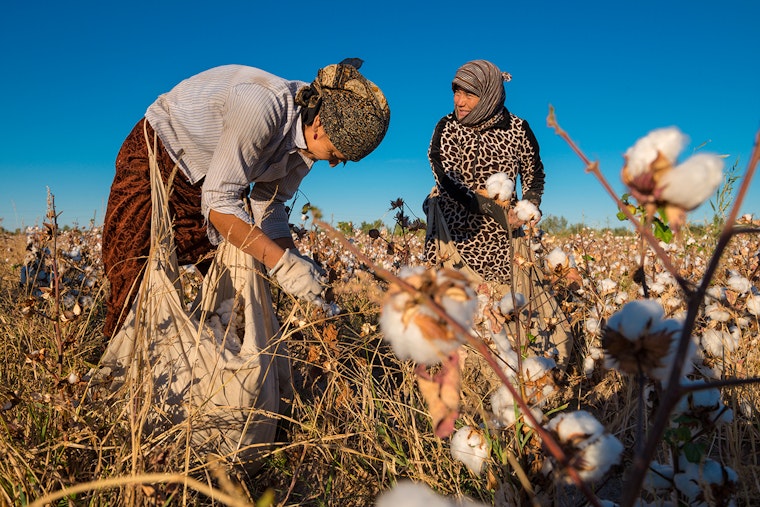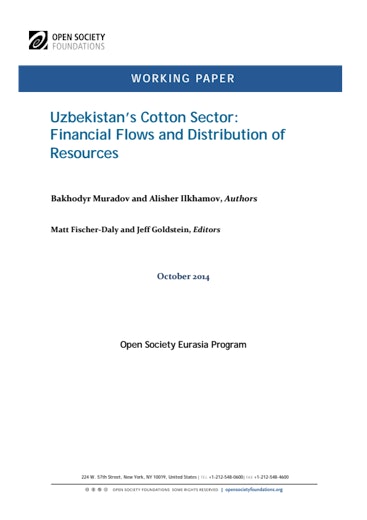Exposing a Disgrace: Uzbek Elite Keep Profiting from Forced Labor
By Jeff Goldstein & Matt Fischer-Daly

Every year, the government of Uzbekistan forcibly mobilizes more than a million of its own citizens to pick cotton. Under international pressure, the authorities in Tashkent have recently moved away from forcing young children to pick cotton. But the system still depends on exporting cotton picked by adults who are essentially government slaves.
We have argued for years that Uzbekistan’s cotton industry amounts to a slave business. Until now, little has been written about how cotton export revenues are managed and distributed in Uzbekistan. But in a new report from the Open Society Foundations entitled Uzbekistan’s Cotton Sector: Financial Flows and Distribution of Resources, former Uzbek government officials and country experts expose the political economy that drives the system of forced labor.
The report diagnoses a dilemma. The Uzbekistani authorities have orchestrated a cultivation system that brings steady flows of hard currency. Yet this same system impoverishes the farmers who grow the cotton and contribute to the misery of those forced to pick the cotton, including students, doctors, and teachers.
The Uzbek government calls cotton the “nation’s wealth,” and demands that citizens participate in the cotton harvest as a patriotic duty.
A schoolteacher who was interviewed by local activists [PDF] in 2013 said, “If you do not arrive to pick cotton, what will happen? They will make you work anyway. We are told that this is our duty to the state. If you do not like it, quit. I cannot quit, then who is going to feed my family? So I have to go. I will work my 25 days and go back to school.”
Ozodlik radio also reported [Uzbek] that three prosecutors in Tashkent province were dismissed in October 2014 simply because they didn’t use all their powers to mobilize the local population for cotton. In Uzbekistan, the government holds prosecutor’s offices and local administrations responsible for supplying labor for the cotton harvest, which highlights the lack of economic incentives for the population to work in the cotton industry.
Having failed to seriously modify a state-controlled cotton system that depends on forced labor, Uzbek authorities have simply replaced schoolchildren with more adult forced laborers. Why does Tashkent impose this burden on its citizens?
Clearly the problem is not a lack of labor; a lack of employment opportunities at home has forced millions of Uzbeks to leave in search of mostly menial jobs in Russia. In the context of the country’s hyper-authoritarian system of government the answers are two: because the small circle at the top has the necessary power and because they profit handsomely from doing so.
The pay that people receive for this forced labor is negligible. And the profits go into a black box called the Agro-Fund. All cotton export profits are accumulated at the Agro-Fund and held in an extra-budgetary account controlled by the people at the very top, where the annual profits from the country’s $1 billion cotton crop can disappear.
Unlike sovereign wealth funds run by other resource-rich countries, the Agro-Fund administrators have no obligation to report to parliament or the public on Agro-Fund revenues or expenditures.
The central government dictates production quotas and domestic procurement prices, manages input markets, controls financing to farmers and all domestic and international sales of Uzbek cotton, and retains complete secrecy around the use of cotton income deposited into the fund. This system essentially creates a vast slush fund for the top leadership to use at their discretion.
Uzbekistan’s Cotton Sector: Financial Flows and Distribution of Resources provides clear recommendations on reforms that could be implemented if the political will existed. Unfortunately, the elite’s addiction to funds over which it has total control almost certainly explains why the Uzbek regime remains committed to maintaining the forced labor system.
To learn more, download the report.
Until August 2016, Jeff Goldstein was the senior policy advisor for Eurasia at the Open Society Foundations in Washington, D.C.
Matt Fischer-Daly coordinates the Cotton Campaign for the International Labor Rights Forum.
